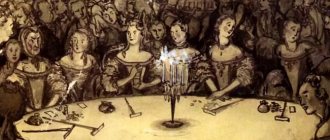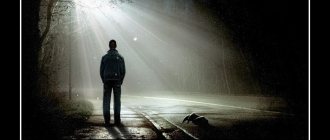I want to know
I want to know
Alexander Selkirk lived in the 18th century, was a Scottish sailor and almost...
(2 photos)
Alexander Selkirk lived in the 18th century, was a Scottish sailor and spent almost four and a half years on a desert island. Stories about his adventures inspired Daniel Defoe to create the book Robinson Crusoe.
The fate of a sailor:
Alexander Selkirk was born in 1676. Since childhood, he had a stubborn character and beat his brothers every now and then. When Alexander was 27 years old, he joined William Dampier's ship on an expedition to South America. Despite his rather young age, Selkirk received the position of boatswain.
Alexander was quick-tempered and constantly clashed with the ship's captain. He once declared that he would rather go ashore on a desert island than continue to sail on a ship that was about to sink to the bottom. The captain did not keep himself waiting long - he ordered Selkirk to be landed on the island of Mas a Tiera, located 670 km from the coast of Chile. Island life
The island became Selkirk's home for a long 4 years and 4 months. At first he lived on the shore, but was soon forced to move inland due to aggressive sea lions. There he discovered feral goats and cats and began growing wild turnips and cabbage. Goats supplied Selkirk with milk, and cats protected him from the attacks of rats, which were also found in abundance here.
From the hoop of an old barrel thrown out by the surf, Alexander made himself a knife. He built two huts from the leaves of pepper trees - he slept in one and cooked food in the other. Alexander’s father worked as a leather tanner, so he could easily make clothes from goat skins. Ships appeared near the island twice. Unfortunately, every time they turned out to be Spanish. Being a Scot and a hired buccaneer, Selkirk understood that he should not expect anything good from the Spaniards. The crew of one of the ships noticed Selkirk hiding in the rocks and sent a search team to the island - but Alexander knew how to hide well, and the Spaniards sailed away. The rescue
Selkirk's epic ended on February 2, 1709, when the ship Duke, belonging to another expedition of William Dampier, moored to his island. The ship's captain was so impressed by Alexander Selkirk's resilience and fortitude that he made him his second mate.
In 1711, Selkirk returned to England, where he had not been for eight years. Newspapers wrote about his adventures. For some time Alexander lived on the mainland, but then went sailing again. Daniel Defoe's book Robinson Crusoe was published in 1719. Robinson's story was very similar to Selkirk's. The cover of the book showed a man wearing goatskins, a garment that would be illogical for the hot tropical islands. However, it was never possible to prove Daniel Defoe's plagiarism. Yes, no one demanded this - in 1721, Selkirk died of yellow fever on board the ship Weymouth off the coast of West Africa.
Now the island where Selkirk spent four years is called “Robinson Crusoe”. Next to it there is another island called "Alexander Selkirk".
Robinson as a slave owner
Despite slavery, Crusoe viewed black people solely as slaves. He believed that slavery was only “bad” for himself, and that people of color were meant to do it. When the rescued Friday began to make signs with his hands to Crusoe, he realized that he “wants to become his slave forever.” Robinson had a personal slave before - the boy Xuri. Crusoe stole it from a pirate and took it with him when he escaped.
Xuri was loyal to his master, but this loyalty is sometimes questionable. For example, he asks to go to an unfamiliar shore and go on reconnaissance himself, so as not to “endanger the owner,” but this could also be a cunning move by a slave planning an escape. Crusoe later gave the boy as a slave to a captain from Portugal, who rescued them. True, this scene is not in the Russian translation - Chukovsky was not allowed to indicate these details in the children's book.
From thin to thick and beautiful: simple eyebrow makeup with photo instructions
The nutritionist named ways to overcome sweet cravings while losing weight
It's time to think about the future harvest: how to grow leeks and care for them
Quotes from the book “The Adventures of Robinson Crusoe” (Daniel Defoe)
It's never too late to wise up.
People are not ashamed of sin, but are ashamed of repentance, are not ashamed of actions for which they should rightly be called insane, but are ashamed to come to their senses and live a respectable and reasonable life.
The expectation of danger is always worse than the danger itself, and the expectation of evil is ten thousand times worse than the evil itself.
...even kings often complain about the bitter fate of people born for great deeds, and regret that fate did not place them between two extremes - insignificance and greatness, and the sage speaks out in favor of the middle as a measure of true happiness, when he prays to heaven not to send him either poverty, nor wealth.
Such is human nature: we never see our situation in its true light until we experience an even worse situation, and we never appreciate the blessings that we possess until we are deprived of them.
How much less would we grumble at fate, and how much more would we be grateful to Providence, if, when reflecting on our situation, we took for comparison the worst, and not the best, as we do when we want to justify our complaints.
Today we love what we will hate tomorrow; Today we are looking for something that we will avoid tomorrow. Tomorrow we will be thrilled by the very thought of what we crave today.
The middle position in society is most conducive to the flourishing of all virtues and all the joys of life: peace and contentment are its servants; moderation, temperance, health, peace of mind, sociability, all kinds of pleasant entertainment, all kinds of pleasures are his blessed companions.
This silent despair was unbearable, because it is always easier to pour out grief in words or tears than to conceal it within yourself.
There are secret springs of passionate inclinations, which, being set in motion by some visible object or by an object, even though invisible, but animated in our consciousness by the power of imagination, carry the soul to this object with such violent force that its absence becomes unbearable.
All our complaints about what we lack stem, it seems to me, from a lack of gratitude for what we have.
But the bad use of material goods is often the surest path to the greatest misfortunes...
Never neglect a secret premonition that warns you of danger, even in those cases when it seems to you that there is no reason to give it faith.
My life was now much easier than before, both physically and morally. As I sat down to eat, I was often filled with deep gratitude to the bounty of Providence, which had prepared for me a meal in the desert. I've learned to look more at the bright side than the dark side of my situation and to remember more about what I have than what I don't have. And this gave me moments of inexpressible inner joy. I am talking about this for those unfortunate people who are never satisfied with anything, who cannot calmly enjoy the blessings given to them, because they always want something that they do not have. All our complaints about what we lack stem, it seems to me, from a lack of gratitude for what we have.
So in every evil you can find good, you just have to think that something worse could happen.
I was upset to the depths of my soul and only then realized—too late, though—how stupid it was to start work without calculating how much it would cost and whether I would have enough strength to complete it.
In a word, nature, experience and reflection have taught me to understand that worldly goods are valuable to us only in so far as they are capable of satisfying our needs, and that no matter how much wealth we accumulate; we enjoy them only to the extent that we can use them, and no more.
He admitted to me later that he asked the gun not to kill him.
Maybe you will find a friend where you least expect to meet him.
Fear is a disease that relaxes the soul, just as a physical illness relaxes the body.
I saw that I should not be discouraged and despair, since in the most difficult sorrows one can and should find consolation.
Sudden joy, like sorrow, deprives one of the mind.
Since then, I have often noticed how illogical and inconsistent human nature is, especially in youth; rejecting the considerations that should be guided in such cases, people are ashamed not of sin, but of repentance; they are ashamed not of actions for which they can rightly be called crazy, but of correction, for which alone they can be considered reasonable.
Tears never stop misfortune.
What island was Robinson on?
History buffs have more than once tried to figure out from the small details from the book which island off the coast of Brazil Robinson was on. Tobago fits the description best. It turns out that from the shore Crusoe could not see the outlines of the mainland, but only the neighboring island of Trinidad. However, one cannot expect absolute authenticity from the author - after all, he himself was not a navigator.
On Tobago, and indeed on all the small islands of the Caribbean, there were no large predators, so it was relatively safe to live there. But there are still many edible fruits growing there. True, the “wild melon” that is mentioned in the book is not there. But perhaps Robinson Crusoe called papaya that way? According to the description of the fruit and the color of the pulp, it is very similar. Everything else that the author describes could have been on any of the small islands, of which there are hundreds of thousands on the planet.
It all started with a lie
Although Defoe more than once called himself “the author of one great book,” this is not entirely true. He had written short novels before, the most famous of which were Roxana (1724) and Diary of the Plague Year (1722). But, of course, “Robinson Crusoe” with its release caused the effect of a bomb exploding. How did the author manage to do this? All thanks to his art of selling lies.
Defoe published the novel under a long title that speaks for itself: “The Life, Extraordinary and Amazing Adventures of Robinson Crusoe, a sailor from York, who lived for 28 years all alone on a desert island... written by himself.” In the original, the title consists of 65 words, but the main ones are the last. That is, the author passed off this story as the autobiography of a person who experienced everything described in the book.
Books and films based on real events are popular at all times. People are interested in knowing all the details of terrible and dangerous events from the inside. In addition, a purely psychological factor also plays a role: since the hero tells all this, it means that he managed to survive. This also attracts readers and viewers - a positive outcome, an indispensable happy ending. The fact that Robinson Crusoe was simply a figment of Defoe's imagination became known later. But during his lifetime, readers sincerely believed that the book was written by a participant in the events himself, and they bought it up with lightning speed, although it cost a lot.
Star help: Topalov is ready to support Samburskaya in a dispute with Drobysh
A beautiful daughter is the decoration of the film: “The North Wind” by Litvinova has been released
Blue is the color of devotion: Kovalchuk spoke about the influence of color on character
The Life and Amazing Adventures of Robinson CrusoeText
27th June 1660. “Another attack, so strong that I lay in bed all day, not eating or drinking.” I was dying of thirst, but I was unable to get up and go get water. Again I prayed to God, but my head was so heavy that I could not remember a single prayer and only repeated: “Lord, help me! Look at me, Lord! Have mercy on me, Lord! So I tossed about for two or three hours until the attack passed. Then I fell asleep and did not wake up until late at night. When I woke up, I felt much more cheerful, although I was still very weak. I was very thirsty, but since there was not a drop of water either in the tent or in the cellar, I had to lie down until the morning. In the morning I fell asleep again and had a terrible dream. I dreamed that I was sitting on the ground behind the fence, in the same place where I sat after the earthquake, when the hurricane blew in, and suddenly I saw that from above, from a large black cloud, all engulfed in flames a man comes down. The flames that enveloped him were so blindingly bright that it was barely possible to look at them. There are no words to describe how scary his face was. When his feet touched the ground, the ground shook as if from an earthquake, and the whole air, to my horror, lit up as if with countless flashes of lightning. As soon as he stepped on the ground, the stranger moved towards me with a long spear in his hand, as if with the intention of killing me. A little before reaching me, he climbed up the hill, and I heard a voice, inexplicably menacing and terrible. Of everything the stranger said, I only understood the end: “Despite all the trials sent down to you, you have not repented: so die!” And I saw how, after these words, he raised his spear to kill me. Of course, everyone who happens to read this book will understand that I am unable to describe how amazingly this terrible dream affected me even while I was sleeping . It is also impossible to describe the impression it left on me when I woke up and realized that it was just a dream. Alas! My soul did not know God: the good instructions of my father evaporated during eight years of continuous wanderings across the seas in constant communication with wicked people like myself, completely indifferent to faith. I don’t remember that during all this time my thought even once soared to God or that even once I looked back at myself and thought about my behavior. A kind of moral dullness came over me: the desire for good and the consciousness of evil were equally alien to me. In my rigidity, frivolity and wickedness I was no different from the most ignorant of our sailors. I had not the slightest idea of the fear of God in danger, nor of the feeling of gratitude to the Creator for delivering me from it... But now, when I fell ill and in my spare time the picture of death presented itself to me very vividly - now, when my spirit began to faint under the burden illness, and my body weakened from a severe fever, my conscience, which had been sleeping in me for so long, awakened: I began to bitterly reproach myself for the past; I realized that by my defiant, vicious behavior I had brought upon myself God’s wrath and that the blows of fate that struck me were only just retribution for me.
Romance or not novel?
Modern critics have different assessments of Defoe's books' commitment to the novel genre. He wrote in a diary style, rare at that time, as if the hero himself was taking notes directly during his journey. In 1719, he published two books at once, and the following year, 1720, four. Not everyone could create masterpieces at such a pace. But were these books novels? Most likely no.
Glafira Tarkhanova shared a rare photo with her husband and four grown sons
Yoko Ono is already 88 years old: what John Lennon’s widow lives and looks like today
Fell in love with a builder: what Anastasia Makeeva’s current lover looks like
Even the author himself never said that he writes novels. These were a kind of fake memoir without indicating the real author. This marketing ploy was unique and innovative at the time. After Defoe, Jonathan Swift took advantage of the same opportunity and wrote Gulliver's Travels. This story was also told in the form of a diary. And even though Swift’s book contained outright fantasy, readers took the author at his word, buying up his books for any money.
Robinson as a slave
In the book, the main character himself was a slave when he was captured by Muslim pirates. But they left alive “white youths, blue-eyed Englishmen.” Those were especially highly valued in Ottoman markets. Sometimes the pirates kept such slaves with them as concubines simply “for prestige.”
In the book, Robinson was “abandoned on the shore for menial work,” but modern experts believe that this was the author’s attempt to hide the problem of the violence to which captives were widely subjected. It is known that Crusoe’s owner constantly kept him and another boy with him, but no menial work was mentioned in the text.







